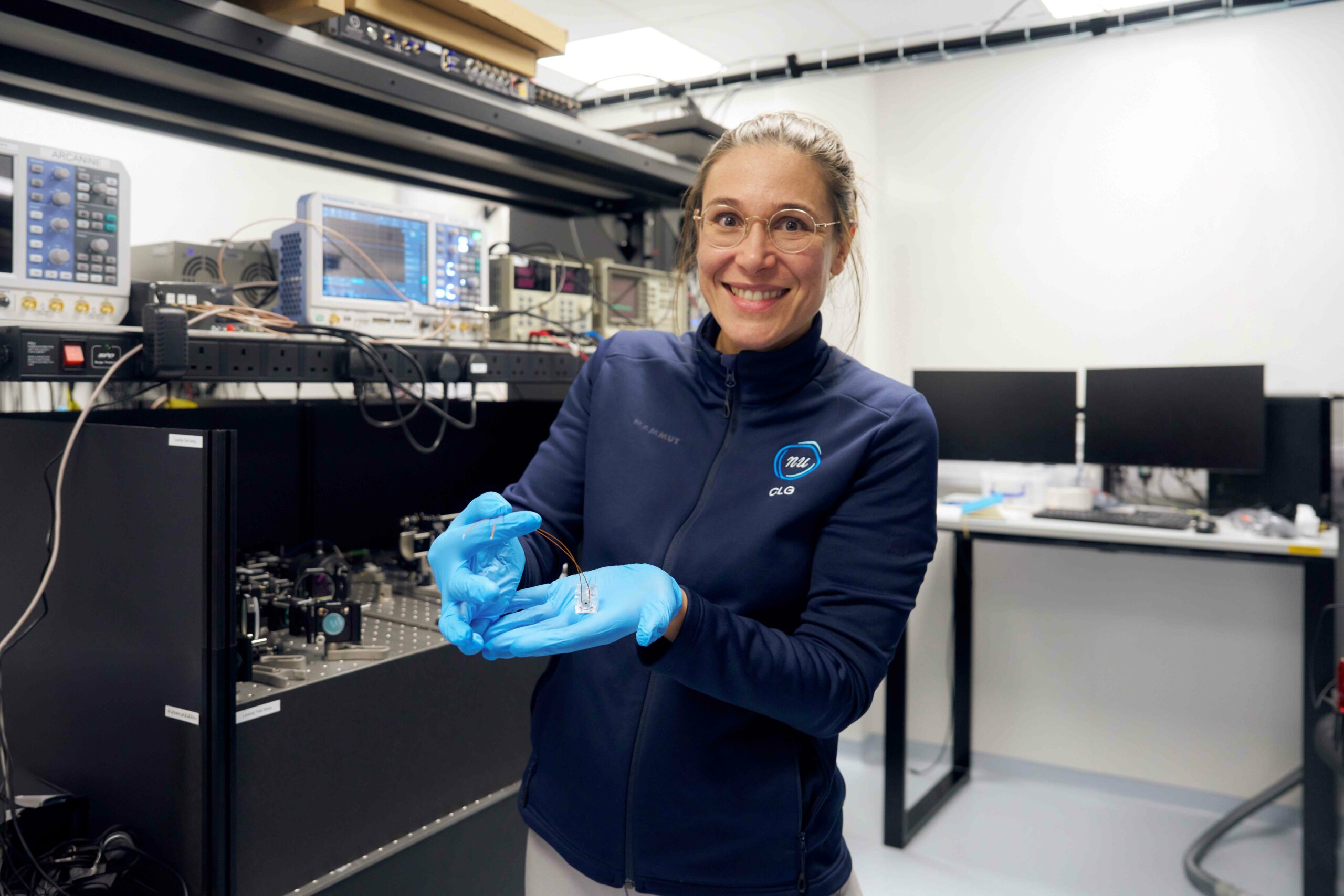Insider Brief:
- Nu Quantum has developed a Qubit-Photon Interface (QPI) prototype that enables modular, distributed quantum computers to connect via a quantum network, similar to Network Interface Cards (NICs) in modern data centers.
- The QPI facilitates efficient transfer of quantum information between matter (qubits) and light, addressing a critical challenge for scaling quantum computers to data center sizes.
- The first QPI has been integrated into Infleqtion’s trapped atom vacuum system and successfully tested, with plans for further improvements in quantum networking speed and photon emission efficiency.
- Nu Quantum’s QPI uses optical microcavities and nanostructured mirrors to enhance qubit-photon entanglement, overcoming engineering challenges related to vacuum stability, low-noise optics, and alignment, making it suitable for future modular quantum computing.
PRESS RELEASE — Nu Quantum announces today a milestone that for the first time opens the door to modular, distributed quantum computers of different qubit modalities and providers: a proof-of-principle prototype that will enable quantum computers to be connected to a quantum network. This technology, a Qubit-Photon Interface, is the equivalent of today’s Network Interface Cards (NICs), which today connect every single computer in a data centre together, and have enabled the Cloud and AI markets.
In order to have a useful quantum computer that can, for example, accurately simulate the world at the atomic level, quantum computers need to be 1000x larger than they are today. They inevitably need to move beyond a single-QPU towards a distributed quantum computer made of hundreds of QPUs and at data centre scales, just like the cloud and AI supercomputers.

The efficient transfer of quantum information between matter and light at the quantum level is the biggest challenge to scaling quantum computers, and the specific issue that the QPI addresses.
Nu Quantum’s QPI has been designed for atomic qubits, and the first version of it has been integrated into Infleqtion’s trapped atom vacuum system and successfully tested under ultra-high vacuum, the harsh conditions under which qubits will need to operate. The next step will be to demonstrate controlled high-efficiency coupling between an individual atom stimulated to emit a photon – tackling one of the most long-standing technical challenges in the industry to date.
Dr. Claire Le Gall, VP of Technology at Nu Quantum, said: “Everyone acknowledges that an efficient interface between qubits and photons -’matter and light’ is critical to scaling quantum computing. It’s been really exciting to work with Infleqtion on this project! We’ve successfully married our QPI-technology (qubit photon interface) with their ultra-high vacuum cold-atom cells. We are pleased with the progress our QPI has made through early-stage testing, and we look forward to further refining its performance. We’re excited to move on to the next phase of our R&D, where we aim for ~100x improvement in quantum networking speed.”
Dr. Marco Palumbo, Director of Business Development UK, at Infleqtion said: “Collaboration is essential to advancing the quantum computing field, and working with partners like Nu Quantum allows us to explore new avenues in connecting qubits to quantum networks. While this is a proof of concept, we look forward to continued experimentation and development in pursuit of scalable quantum technologies.”
Technical Explanation of the problem-solution:
Enhancing qubit-photon entanglement is the first step towards modular and scalable distributed quantum computers.
- Creating qubit-photon entanglement with high-fidelity and high-rate is today the single biggest technical challenge preventing the modular scaling of quantum computer, communication and sensor networks.
- The QPI aims to significantly improve entanglement rates over current lab methods, with the goal of enabling industrial-scale deployment.
Technical achievements being announced:
- Nu Quantum’s solution uses optical microcavities to enhance the coupling between light and matter. Nanostructured mirrors, fabricated using our world-leading proprietary process, are assembled together with micron-level precision, and the distance between them actively stabilised to < 80 pm.
- Open microcavities allow enhanced interaction between the qubits and the networking photons, whilst keeping all material far enough away to protect the delicate qubit state from outside noise, and keeping access for control lasers.
- This is the first industrial demonstration of a passively aligned optical microcavity with a tunable lock to guarantee operation at the qubit resonance.
- Several engineering challenges have been overcome: low noise locking optics and electronics has been developed in a robust, deployable form; cavity alignment has remained stable under high temperature vacuum bakeout; the materials used in the QPI construction have not adversely affected the quality of the vacuum.
Future commercial opportunities and significance:
- Nu Quantum’s aim is to eventually allow any Neutral Atom qubit provider to plug into Nu Quantum’s networking infrastructure, enabling modular scaling: from individual quantum processing units (QPUs) to data centre-scale Distributed Quantum Computers.
Project ‘Calyx’ was sponsored by a grant from Innovate UK under the ISCF Commercialising quantum technologies: feasibility studies round 3.
About Nu Quantum
Nu Quantum is creating the Entanglement Fabric for quantum computing scale-out. In order to achieve transformational impacts, quantum computers must go from hundreds to millions of qubits. Our approach is to interconnect many Quantum Processing Units (QPU) by creating high-quality entanglement between them, to form a larger and more useful quantum computer. We are creating full hardware solutions to create these entangled qubit networks, including a unique high-speed computer network interface, photonic switching fabric, and control systems to build towards multi-core quantum supercomputers and quantum data centres. Partnering with leading quantum companies, governments and research groups, we are accelerating quantum out of the lab and into real world use.
Founded in 2018, Nu Quantum is a spin-out of the University of Cambridge’s Cavendish Laboratory. In November 2023, the company raised a £8.5M pre-series A round from main investors Amadeus Capital Partners, IQ Capital, and Expeditions Fund. Find more information at https://nu-quantum.com/.















